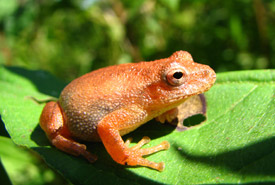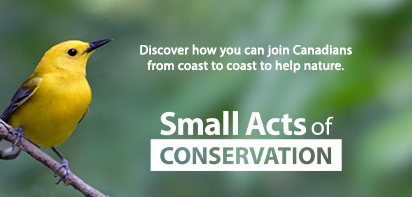Biodiversity 101

Spring peeper (Photo by Ryan M. Bolton)
What is biodiversity?
Simply put, biodiversity is the variety of plants and animals in the world, or in a particular area. If the earth's living systems are to remain strong and healthy, those systems must have a high level of biodiversity. Our well-being depends on it.
How much biodiversity is being lost?
The world is so big and complex that science discovers new species all the time. As a result, we don’t know exactly how many share our planet, or how many we are losing. Currently (according to the Convention on Biological Diversity) approximately 13.5 million species have been identified, although scientists estimate that there are actually between three to 100 million species on Earth.
What causes biodiversity loss?
Human population growth and consumption levels (our ecological footprint) are the reasons for the huge loss of biodiversity. We are using resources faster than the earth can regenerate them. Habitat destruction, illegal wildlife trade and unsustainable uses of natural resources are among the major causes for decline in plant and animal populations.
How does biodiversity loss affect us?
Biodiversity is the web of life; the link between all organisms on earth. Each species has a role and this creates an interdependent ecosystem upon which families, communities and the children of tomorrow depend.
Since we are all linked, it’s not just animals and plants that are at risk. Our health and our livelihoods are at risk too. Millions of people face a future with shortages of food and fresh water as our planet's biodiversity is reduced.
“Human health is strongly linked to the health of ecosystems, which meet many of our most critical needs,” says Maria Neira, director of the World Health Organization's Department for the Protection of the Human Environment.
How does the Nature Conservancy of Canada’s work help?
The Nature Conservancy of Canada (NCC) is the nation’s leading not-for-profit, private land conservation organization. For 50 years, we have been working to protect our most important and biologically diverse natural areas and the plants and animals they sustain.
Since 1962, NCC and our partners have helped to conserve 15 million hectares of ecologically significant land, coast to coast to coast.
Investing in conservation means that NCC is protecting biodiversity by ensuring that our natural world remains a home for wildlife, a haven for recreation and a vital resource that cleans the air we breathe and the water we drink.
Quick facts
- The word biodiversity was coined in 1985 as the contraction of "biological diversity."
- Humans have changed the earth’s ecosystems more rapidly and extensively in the past 50 years than in any other period of human history.
- We are currently using 25 per cent more natural resources than the planet can sustain.
- In 2009, humanity used 40 per cent more resources than nature can regenerate in a year.




